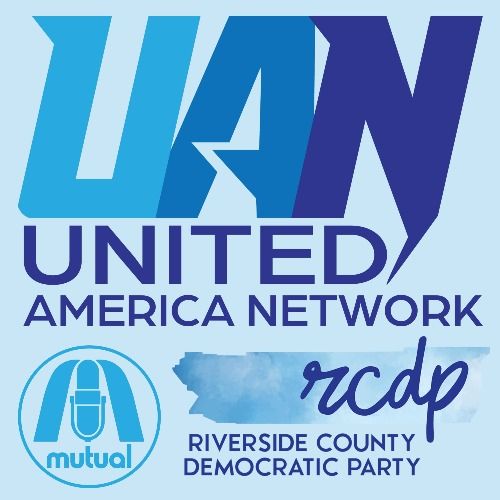Pastor Matt Schultz | Exposing the Dangers of Christian Nationalism in America
In this powerful episode of Hotspots, Pastor Matt Schultz of Anchorage, Alaska, joins the United America Network to break down the growing threat of Christian nationalism in the United States. Schultz, a Presbyterian USA minister and published writer on the subject, explains how Christian nationalism is not Christianity at all, but rather a political ideology fueled by authoritarianism, racism, and exclusion. He contrasts it with the principles of authentic Christianity, which emphasize love, humility, and inclusion. Together with host Kay Brown, Schultz explores how this ideology undermines democracy, erodes the separation of church and state, and directly impacts the daily lives and freedoms of Americans. From attacks on immigrants and LGBTQ+ communities to the erosion of women’s rights, the dangers are urgent. Yet both Schultz and Brown highlight reasons for hope—through voting, building bridges, and deepening understanding of theology. This is a timely, eye-opening conversation about preserving democracy and protecting true religious freedom.
Takeaways:
- Christian nationalism is a political ideology, not Christianity.
- It seeks power by merging religion with right-wing politics.
- True Christianity focuses on humility, love, and inclusivity.
- Christian nationalism overlaps with racism, misogyny, homophobia, and xenophobia.
- Policies such as ICE raids and abortion restrictions are tied to this ideology.
- It threatens religious freedom by imposing one faith’s beliefs on all.
- Combating it requires voting, relationships, and deeper theological education.
- There is still hope through awareness, resistance, and grassroots action.
#HotspotsPodcast #KayBrown #UnitedAmericaNetwork #ChristianNationalism #FaithAndFreedom #DemocracyAtRisk #SeparationOfChurchAndState #ReligiousFreedom #StopAuthoritarianism #InclusiveChristianity #ProtectDemocracy #EndHatePolitics #FaithAndJustice #VoteForFreedom #HopeInAction #ChristianVoices #FreedomForAll #RejectExtremism #AmericanValues #EqualityForAll #PastorMattSchultz
Transcript
Kay Brown:
Hello, thank you for joining me here on United American Network. I'm Kay Brown, your host of Hotspots, broadcasting today from our spectacular desert location in Riverside County, California. We're going to be discussing Christian nationalism and the profound impacts it's having on our country. Christian nationalism is a through line that connects the authoritarian takeover of our government.
Kay Brown:
and the unrelenting assaults we're seeing on democracy, the rule of law, our health and our personal freedoms. As it's playing out in our country today, Christian nationalism is essentially the marriage of fundamentalist religion, right-wing politics, and attempts to extend and consolidate authoritarian power. It's a scary time for our country.
Kay Brown:
and a tough time for people who care about an inclusive society and religious freedom for all. I'm happy to welcome Reverend Matt Schultz today to discuss this with me. Thank you, Reverend Schultz, for being here. ⁓ Matt Schultz is an ordained pastor in the Presbyterian USA Church serving in Anchorage, Alaska, and he has written recently in national publications on this topic. Thanks for joining me, Matt.
Matt Schultz:
It is my pleasure and it's great to see you.
Kay Brown:
Yeah, great to see you too. As a member, ⁓ back up, scratch that when I correct, you are a minister of a Christian denomination. Why do you oppose Christian nationalism?
Matt Schultz:
That's a great question and one that we get a lot because the title Christian nationalism ⁓ intentionally tries to make it sound like it is a Christian thing. And so of course, wouldn't Christians agree with it? Like if you served me Christian hamburgers, wouldn't I like those better? ⁓ But ⁓ no, that's not the case. Christian nationalism is not a Christian belief. It is rather a political ideology that tries to ⁓ centralize and empower ⁓
Matt Schultz:
a very ⁓ small sect of Christianity. ⁓ It's certainly not a sect to which I belong, and by empowering that group, it tries to ⁓ eliminate the separation of church and state and give all the power just to a very, very small slice of the pie of hyper conservative evangelicals in the US.
Kay Brown:
And so how does Christian nationalism differ from the Christianity that you ⁓ subscribe to and preach and teach? What's different about that ⁓ perspective than ⁓ the Christianity that you... ⁓ I want to back up there. How is it different from the Christianity that you embrace?
Matt Schultz:
Lots and lots of ways. I'll probably think of more throughout our conversation ⁓ but certainly the ⁓ the hunger for power is one of those things and we see that in the election of Donald Trump that ⁓ people who embrace Christian nationalism are more than happy to ⁓ Just brush aside all of the the terrible behavior the non-christian life that he's led
Matt Schultz:
⁓ in order to gain proximity to that presidential power. They're very happy to close their eyes to accusations of being on the Epstein list, for example, you know, to say, that doesn't matter because he's our guy, he's in power, and that's what we want. In Christianity, we don't strive for political power as the end. We strive for love ⁓ and prayerfulness and humbleness of spirit. Those are the things we're going for. Christian nationalism is going for a permanent grasp of power.
Matt Schultz:
It's also important to add in that the ⁓ groups that are overtly Christian nationalists are also overtly racist and homophobic and misogynistic and xenophobic. And so there's a great deal of overlap between Christian nationalism and hate groups.
Kay Brown:
So are those perspectives ⁓ affecting people's lives? Are we seeing those ⁓ homophobia and so forth embedded in law and policy in the United States? Is this actually ⁓ affecting how people are living or affecting their lives today?
Matt Schultz:
Well, for sure. think the one that we see most, ⁓ most visually right now, the thing that's happening most is the ICE raids that are largely built on xenophobia and racism together. ⁓ And ⁓ it's not necessarily being done as a Christian endeavor, but it's being done by the same people who ⁓ self-identify as Christians and many of them self-identify as Christian nationalists are also the ones saying,
Matt Schultz:
let's have these ice raids increase and continue to increase and continue to increase. This despite the fact that the Bible ⁓ dozens and dozens of times has the voice of God saying, you must welcome the immigrant, you must welcome your neighbor. ⁓ I'm sorry, you must welcome the immigrant, you must welcome the refugee, you must welcome the alien living among you and treat them as one of your own. So despite it being a direct.
Matt Schultz:
opposition to what scripture says, they're saying, hey, here we are the Christians doing this thing.
Kay Brown:
So, ⁓ separation of church and state ⁓ is a fundamental principle ⁓ that we have been abiding by since the beginning of our nation, ⁓ and that seems to be blurring now in more ways. ⁓ Do you see Christian nationalism as a threat to religious freedom ⁓ for people in the United States today?
Matt Schultz:
absolutely. Yeah. You can see that some of their laws coming forward will want to do things like ⁓ outlaw abortion, for example, and they use as their reason for that their religious perspective. My religious perspective leads me to be pro-choice. ⁓ And so if they're using their faith as a way to say our faith groups policy is being enacted here, well, they've chosen their faith over mine. Same with my full inclusion of
Matt Schultz:
people who are LGBTQ, right? If ⁓ my faith directs me right to saying we must be fully inclusive. And now they're saying, well, no, because of how we interpret the Bible, we're going to make gay marriage illegal or ⁓ any of the other ⁓ things that are going on within that front. ⁓ Then they're suddenly saying that their religious perspective takes precedence over my own. They are establishing ⁓ a state religion. And anytime you establish a state religion throughout all of history, goes very
Matt Schultz:
very poorly for any other religion in that nation. And they like to think that just because they put Christian on it somehow makes it okay or somehow makes it pertinent to all Christians. But their version of Christianity ⁓ is ⁓ so far away from mine, for example, they're almost unrecognizable as the same religion.
Kay Brown:
So what ⁓ is, ⁓ let me back up please, what is the solution to the ascendance of Christian nationalism for those of us who want to maintain democracy and maintain the rule of law?
Matt Schultz:
this point is to vote in the:Matt Schultz:
real relationships with people you know and have known for a long time who are starting down this path or are part of that world of Christian nationalism. It's easy in this age of social media ⁓ to get hyper fragmented in our cultural ⁓ circles and only hang out with people that already agree with us. ⁓ We need to fight against that urge. It's way easier to say I'm just gonna hang out with everyone who agrees with me, but
Matt Schultz:
What that does is it allows something terrible like Christian nationalism to fester and grow because they're all talking to each other too and it gets more more ⁓ deeply entrenched and it starts spreading out. So we need to keep those relationships with people and keep on talking to them about this. They need to know when they say something like, this is a Christian nation, they're gonna get pushback from devout Christians like me when I say, no, this is not a Christian nation. And that's where the conversations. ⁓
Matt Schultz:
start and they find their way into the ballot box from there as well. ⁓ Finally, the last thing I, I mean, there's lots more, but the last one I'll float for you right now. ⁓ I really think it's of the utmost importance to learn liberal theology. There are people that are promoting Christian nationalism are trying to use a very, very ⁓ shallow version ⁓ of what they think Christianity is. And it's, it's ⁓ not very academically sound. It's not well thought through.
Matt Schultz:
it's essentially just wrapping a flag around a cross and saying, we're the good guys. We need to be better educated to know the theology to really say, no, that's not how it works. ⁓ You cannot marry those two things. They can be harmonious, but you cannot marry those two things together ⁓ or else this is the problem that you cause.
Kay Brown:
So do you see, ⁓ excuse me, start again. Do you see reasons for hope ⁓ in the current situation, which seems discouraging to a lot of people? What gives you hope?
Matt Schultz:
Well, hope is my whole jam. That's ⁓ my thing. And so, yes, I definitely have hope. There's a lot of reasons why. ⁓ Along with being a student of theology, I am also a student of history. And I know very well that even though things are bad right now, they have been worse in other times in the past. And even though things are bad for us now in this regard, they're good for us in other ways. know, infant mortality is better than it's ever been in history.
Matt Schultz:
And they're bad for us in our country now, but in other parts of the world, they're good. And also, other parts of the world have seen what we're seeing now. And so we're feeling it because it's hitting us. But other places have come through this and have found a way to get better afterwards. So ⁓ it's good to have a global and a historical perspective to say, OK, this danger is real. It is a clear and present danger to our country. And also, we have overcome these sorts of things before, and we will again. ⁓
Matt Schultz:
So I see that hope at the many marches that are going on when tens of thousands, hundreds of thousands, millions of people are taking to the streets to voice their protest and to do so peacefully. ⁓ That gives me hope that this is an ongoing thing. ⁓ And ⁓ even though a lot of damage has been done, there are still elections to come and we can correct that damage.
Kay Brown:
I see ⁓ those same ⁓ opportunities before us ⁓ and other reasons for hope that Trump is losing popularity, his policies are losing popularity, he's underwater in a lot of the country in the recent polling. So I think as awareness grows of the scandals and the corruption and the cruelty that ⁓
Kay Brown:
are unfolding before us, more people will come to question how we got here and what we're going to do about it. ⁓ The threats to health, the ⁓ limiting access to vaccines, ⁓ that, ⁓ you know, it's just kind of ⁓ a development that I think will wake some people up who perhaps haven't been tuned into this before. And then ⁓ the economy ⁓ and ⁓ the impacts that were
Kay Brown:
beginning to see from the effect of the tariffs and the other things that are being implemented. ⁓ But most of all, for women, just the loss of personal freedom that we have experienced over the last couple of years really coming to fruition now in this ⁓ administration. So ⁓ there are a lot of things to be concerned about, but what I'm hopeful about is the resistance does seem to be gaining momentum.
Matt Schultz:
Yeah.
Kay Brown:
⁓ as more people ⁓ come to ⁓ want to address it in some way, but it's a challenge because it's not immediately apparent what's gonna be effective. ⁓ And there are millions of people that are now engaging, but do we have a big enough force to ⁓ get their attention and to really ⁓ make the kind of pushback that will... ⁓
Kay Brown:
stop things. And I think we've seen a few examples of where Trump has pivoted or backed down, although he never admits that he's doing that, in response to ⁓ people standing up to him. know, bullies ⁓ often maintain ⁓ their power when no one stops them or tries to stop them. So with our leaders beginning to push back, that's an encouraging sign. ⁓
Kay Brown:
but it's gonna take a lot of hard work and a lot of unity of message and of perspective and determination for us to get through this successfully.
Matt Schultz:
You've seen ⁓ other days of discord and hardship. How does this compare, in your opinion?
Kay Brown:
It's ⁓ more dramatic than anything I've experienced in my lifetime. ⁓ I don't recall a time feeling ⁓ as ⁓ alarmed about the ⁓ changes ⁓ and the destruction that I see of the agencies, the loss of science, the loss of emergency response capability, the loss of monitoring the climate.
Kay Brown:
⁓ In my ⁓ professional life, I work on climate change issues and it's ⁓ just very discouraging to see our country leave the international stage and stop being a positive force to address this ⁓ crisis that we're in. And that has just been really pushed to the back as the president continues to...
Matt Schultz:
Yeah.
Kay Brown:
promote more fossil fuel development and oil and gas as the solution and ⁓ so on. So that's all very, very troubling. But I do think ⁓ there's a path forward ⁓ and ⁓ it begins with awareness and awareness ⁓ that touches people leads to action ⁓ and ⁓ action is going to help us consolidate a movement. And that's what we're working on here at United America Network.
Kay Brown:
⁓ We're building a movement ⁓ and we hope that people will join us here ⁓ and ⁓ be active in the push back to come in the coming weeks and months.
Matt Schultz:
Yeah, yeah. So often at the rallies or at I just taught at a class on Christian nationalism, ⁓ the outgrowth of the one that you ⁓ created with Larry Michael. ⁓ And I taught at one of those classes. And at the end of all of these things, people always finish by saying, well, what can we do that awareness is great? And now I've learned this. ⁓ Where do I go to do something productive and constructive? And that's always
Matt Schultz:
It's a lovely thing to hear, right? It shows how much they care. They want to take action. And of course we say, you know, vote and get in early to support candidates. But ⁓ I'm always looking for ideas if you have more things that we can do to get people involved. We can send them your way for sure.
Kay Brown:
e have to keep our eye on the:Kay Brown:
⁓ For today, we'll ⁓ leave it there in this podcast. We're working on raising awareness about the situations around us that need attention, and this is certainly one of them, ⁓ and trying to ⁓ articulate the positive steps people can take, that we can take together to stop this downward spiral of authoritarianism that we're experiencing. So we hope you'll join us.
Kay Brown:
We hope you'll join the movement here on United American Network. This is what democracy looks and sounds like. UnitedAmericanNetwork.com.


